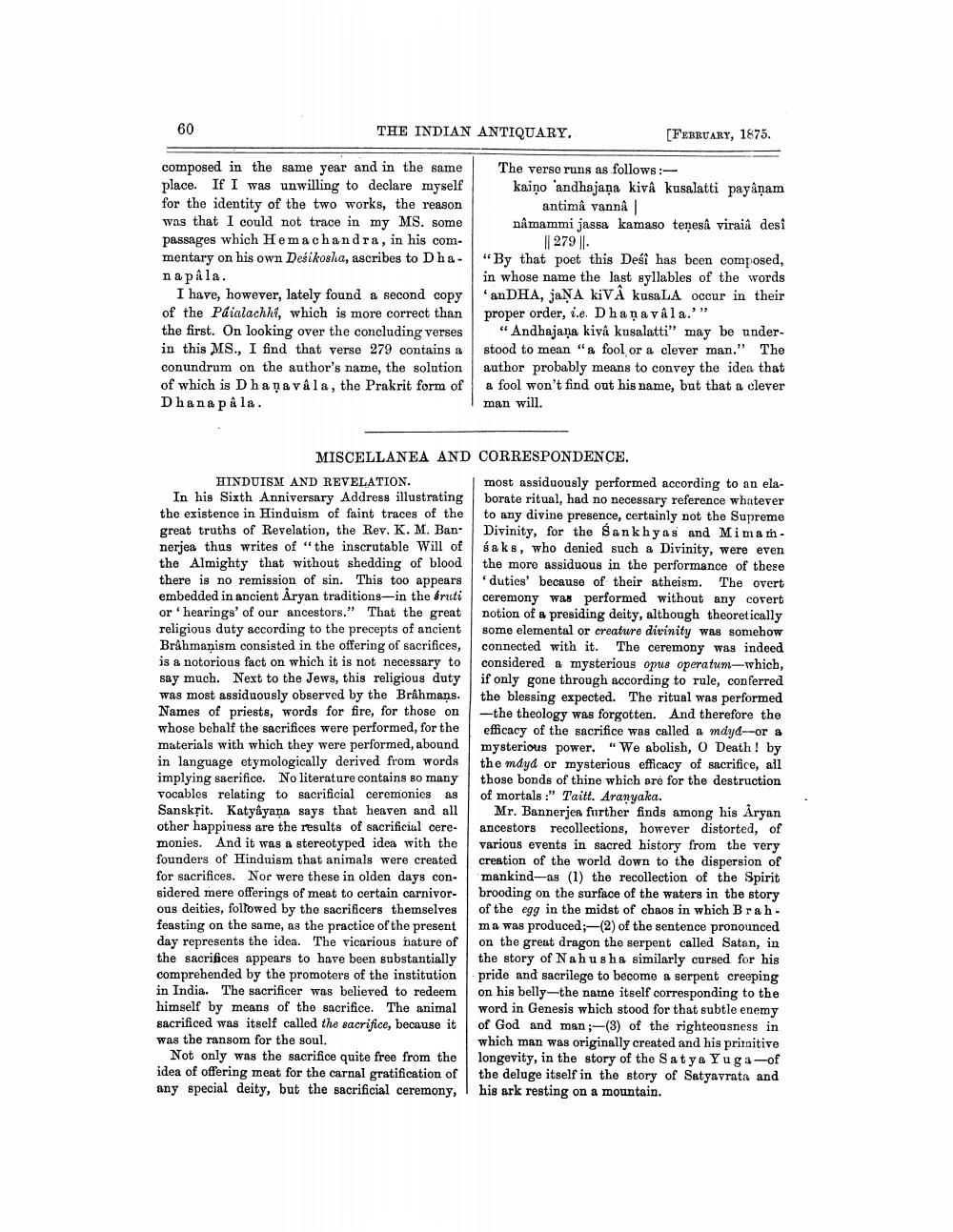________________
60
THE INDIAN ANTIQUARY.
[FEBRUARY, 1875.
composed in the same year and in the same place. If I was unwilling to declare myself for the identity of the two works, the reason was that I could not trace in my MS. some passages which Hemachandra, in his commentary on his own Desikosha, ascribes to Dha- na pala.
I have, however, lately found a second copy of the Pdialachhi, which is more correct than the first. On looking over the concluding verses in this MS., I find that verse 279 contains a conundrum on the author's name, the solution of which is Dhanavala, the Prakrit form of Dhana pala.
The verso runs as follows:kaiņo 'andhajaņa kiva kusalatti payanam
antimâ vannå nâmammi jassa kamaso tenesa viraia desi
| 279 ||"By that poet this Desi has been composed, in whose name the last syllables of the words
anDHA, jaŅA kiv kusaLA occur in their proper order, i.e. Dhaņa vála.'”
"Andhajana kiva kusalatti" may be understood to mean "a fool or a clever man." The author probably means to convey the idea that a fool won't find out his name, but that a clever man will.
MISCELLANEA AND CORRESPONDENCE. HINDUISM AND REVELATION.
most assiduously performed according to an ela. In his Sixth Anniversary Address illustrating borate ritual, had no necessary reference whatever the existence in Hinduism of faint traces of the to any divine presence, certainly not the Supreme great truths of Revelation, the Rev. K. M. Ban- | Divinity, for the Sankhvas and Mimath nerjea thus writes of "the inscrutable Will of saks, who denied such a Divinity, were even the Almighty that without shedding of blood the moro assiduous in the performance of these there is no remission of sin. This too appears duties' because of their atheism. The overt embedded in ancient Aryan traditions-in the bruti ceremony was performed without any covert or hearings' of our ancestors." That the great notion of a presiding deity, although theoretically religious duty according to the precepts of ancient some elemental or creature divinity was somehow Brahmanism consisted in the offering of sacrifices, connected with it. The ceremony was indeed is a notorious fact on which it is not necessary to considered a mysterious opus operatum-which, say much. Next to the Jews, this religious duty if only gone through according to rule, conferred was most assiduously observed by the Brahmans. the blessing expected. The ritual was performed Names of priests, words for fire, for those on -the theology was forgotten. And therefore the whose behalf the sacrifices were performed, for the efficacy of the sacrifice was called a mdyd--or a materials with which they were performed, abound mysterious power. “We abolish, O Death! by in language etymologically derived from words the mayd or mysterious efficacy of sacrifice, all implying sacrifice. No literature contains so many those bonds of thine which are for the destruction vocables relating to sacrificial ceremonies as of mortals." Taitt. Aranyaka. Sanskrit. Katyayana says that heaven and all Mr. Bannerjen further finds among his Aryan other happiness are the results of sacrificiul cere- ancestors recollections, however distorted, of monies. And it was a stereotyped idea with the various events in sacred history from the very founders of Hinduism that animals were created creation of the world down to the dispersion of for sacrifices. Nor were these in olden days con- mankind-as (1) the recollection of the Spirit sidered mere offerings of meat to certain carnivor-| brooding on the surface of the waters in the story ous deities, followed by the sacrificers themselves of the egg in the midst of chaos in which Brahfeasting on the same, as the practice of the present ma was produced;-(2) of the sentence pronounced day represents the idea. The vicarious nature of on the great dragon the serpent called Satan, in the sacrifices appears to have been substantially the story of Nahusha similarly cursed for his comprehended by the promoters of the institution pride and sacrilege to become a serpent creeping in India. The sacrificer was believed to redeem on his belly-the name itself corresponding to the himself by means of the sacrifice. The animal word in Genesis which stood for that subtle enemy sacrificed was itself called the sacrifice, because it of God and man;-(3) of the righteousness in was the ransom for the soul.
which man was originally created and his primitive Not only was the sacrifice quite free from the longevity, in the story of the Satya Yuga-of idea of offering meat for the carnal gratification of the deluge itself in the story of Satyavrata and any special deity, but the sacrificial ceremony, his ark resting on a mountain.




